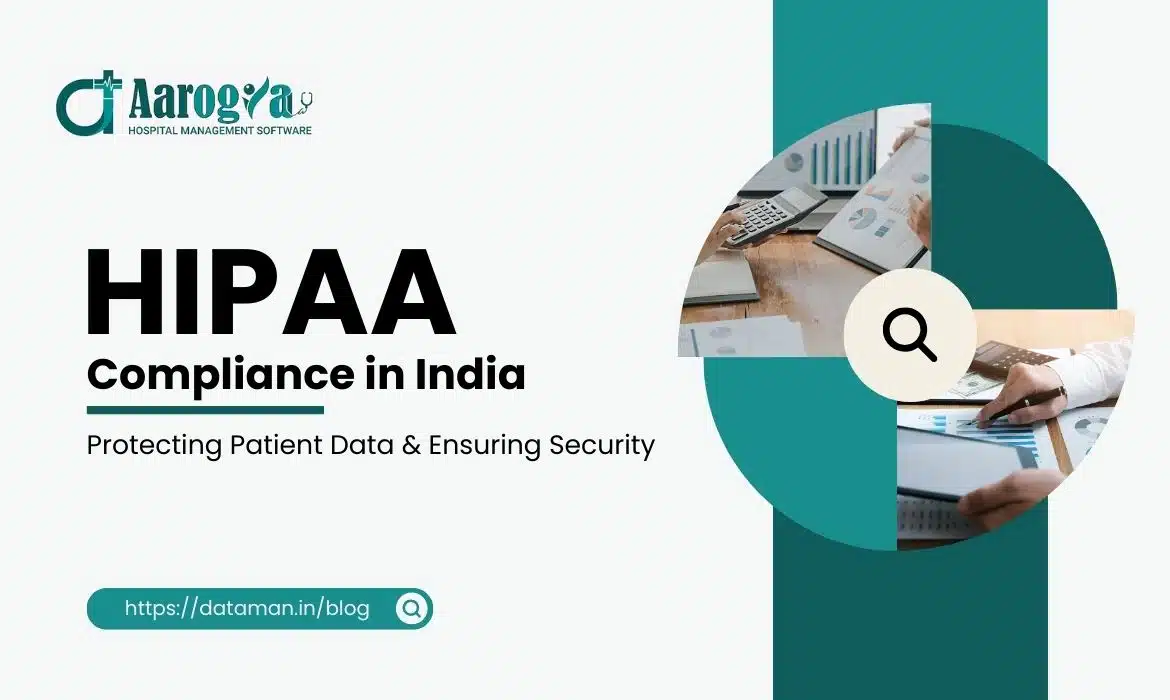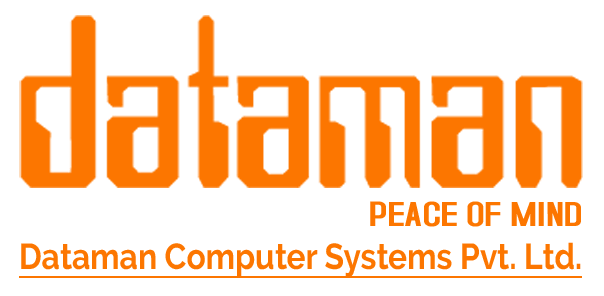- +91 9511117684
- shweta@dataman.in

Table of Contents
Post Views: 12,333
HIPAA Compliance in India: When we think about data security, it’s not limited to social media or servers of large organizations.
Data security is imperative, especially in the healthcare industry.
In an era where electronic health records (EHRs) are increasingly prevalent, even the Government of India is also promoting digital healthcare through the Ayushman Bharat Digital Mission, safeguarding patient information has become more critical than ever.
A breach of patient data can lead to serious consequences, including identity theft, financial loss, and damage to the reputation of HMIS providers.
To address these concerns, industry standards and regulations have been established to ensure the protection of sensitive health information.
HIPAA compliance in India is one such crucial standard that healthcare organizations must adhere to.
For healthcare providers in India, understanding and implementing HIPAA compliance is essential to safeguard patient data and maintain trust.
Understanding HIPAA
HIPAA stands for Health Insurance Portability and Accountability Act. It is a federal law in the United States that sets standards for the privacy and security of personal health information (PHI).
HIPAA sets forth a set of rules and guidelines to protect the privacy and security of patient’s health information. At the same time, it lets doctors and hospitals use this information to treat patients, bill for services, and run their healthcare businesses.
Generally, HMIS solution providers offer the capability to store and easily access patient information. To ensure data security and compliance with HIPAA regulations, it’s essential to select a reliable HMIS provider for your healthcare facility.
Key Components of HIPAA
1. Privacy Rule: This rule establishes standards for the use and disclosure of PHI by healthcare facilities. It protects individuals’ rights to access, amend, and receive a copy of their PHI.
2. Security Rule: This rule sets standards for the security of electronic PHI. It requires healthcare facilities to implement administrative, technical, and physical safeguards to protect PHI from unauthorized access, use, disclosure, or modification.
3. Breach Notification Rule: This rule requires healthcare facilities to notify individuals and the top government regulatory authority in the event of a data breach that compromises PHI.
Read More: What is HMIS & Why Every Hospital Should Have An HMIS
HIPAA Compliance in India
Adhering to HIPAA compliance standards can pose unique challenges for Indian healthcare services providers. Some of the key challenges include:
Cultural and Linguistic Barriers: Communicating complex HIPAA regulations to healthcare professionals who may not be fluent in English can be difficult.
Technological Limitations: Many healthcare facilities in India may lack the necessary infrastructure or resources to implement robust security measures.
Limited Awareness: There may be a lack of awareness about HIPAA compliance among healthcare professionals and administrators.
Cost Implications: Implementing HIPAA compliance measures can be costly, particularly for smaller healthcare facilities.
Despite these challenges, HIPAA compliance also presents significant opportunities for Indian healthcare providers. By demonstrating their commitment to data privacy and security, healthcare facilities can:
Enhance Patient Trust: Patients are increasingly concerned about the security of their personal health information. By complying with HIPAA, healthcare providers can build trust with patients.
Improve Reputation: HIPAA compliance can enhance the reputation of healthcare facilities, attracting more patients and business partners.
Stay Competitive: As healthcare becomes increasingly globalized, HIPAA compliance can give Indian healthcare providers a competitive advantage.
What Does It Mean to Be HIPAA-Compliant in India?
A HIPAA-compliant HMIS provider is committed to safeguarding the privacy and security of its clients’ sensitive health information (PHI). This commitment involves a comprehensive approach that includes:
- Robust Technical Safeguards: Implementing strong security measures to protect PHI from unauthorized access, use, disclosure, or alteration.
- Data Integrity and Availability: Ensuring that PHI is accurate, complete, and accessible when needed.
- Employee Training: Educating staff on HIPAA regulations and best practices for handling PHI to prevent breaches.
- Vendor Management: Requiring associated third-party vendors to adhere to HIPAA standards and conducting due diligence to ensure compliance.
- Regular Audits and Assessments: Conducting periodic reviews of data security practices to identify and address potential vulnerabilities.
Our HIPAA Compliance HMIS Solution for India's Healthcare Sector
Aarogya is one of the leading hospital management information System (HMIS) solution providers in India, serving a wide range of healthcare organizations, including clinics, hospitals, laboratories, pharmaceutical, telemedicine providers, health technology firms, insurance companies, blood banks, research institutions, government agencies, and academic medical centers.
How Aarogya Stays Updated of HIPAA Compliance
At Aarogya HMIS, we’re committed to ensuring our clients can confidently utilize their data. To achieve this, we stay meticulously updated on the latest HIPAA regulations and requirements. Here’s how we keep our team informed:
- Monitoring HHS Updates: As the primary enforcer of HIPAA, we closely follow the Department of Health and Human Services’ website for regular updates and guidance.
- Attending Industry Events: Our leadership team regularly participates in industry conferences and training sessions to stay abreast of the latest HIPAA developments and compliance best practices.
- Subscribing to Industry Publications: We subscribe to leading publications to stay informed about changes in HIPAA regulations, their impact on data ecosystems, and innovative compliance solutions.
- Conducting Regular Internal Audits: To ensure our team’s ongoing adherence to HIPAA, we conduct frequent quality audits to identify and address any compliance gaps.
Read More: Top 5 Hospital Management Software in India
Conclusion
In conclusion, HIPAA compliance in India is a crucial aspect of healthcare data management. By adhering to the principles outlined in HIPAA, healthcare providers can safeguard patient information, maintain trust, and avoid costly penalties.
0

